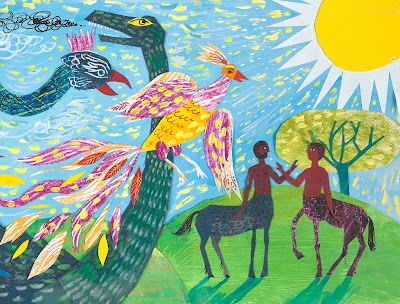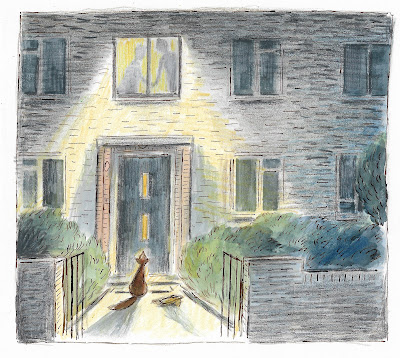REPRESENTATION LGBTQ+ Community (PART 1)
To mark LGBT+ History Month, Words & Pictures Editor, Gulfem Wormald, talks to Author and Illustrator James Mayhew about how he represents this fabulous community in children's books and what it was like for him to grow up hiding his true self.
Over several years I’ve increasingly found the confidence to include LGBTQ+ representation in my illustrations. The first book I made an obvious choice about was Gaspard the Fox by Zeb Soanes. The story, loosely based on how he and his partner befriended a fox, features two men living in the same house; Zeb and I agreed that I should show them holding hands, even though only as a silhouette. Although quite a recent book, it already felt significant at the time. Since then I regularly include same-sex couples to show an inclusive society in the Gaspard series.
The simple fact that I saw no representation at all growing up, and I’d hate anyone to have the same sense of not belonging, of shame and fear, that my generation had. It’s deeply damaging to have a relentlessly “straight” vision of Happy Ever After forced upon you throughout your childhood. To be invisible, or dismissed as an “abomination” is a horrible feeling.
What challenges did you encounter?
Obviously I work with children, and I was certainly anxious that I might encounter problems. I’m happy to say that has not been the case. The publishers have also been marvellously supportive. Any challenges were more personal and internal. Several times I felt myself holding back, afraid of how inclusive characters might be received. I had to remind myself that this was my upbringing, my “damage” talking. I had to let go of that. It’s a sad fact that I still have to choose carefully where and when I hold my husband’s hand in public. It felt very empowering to show gay characters holding hands in Nen.
Amazingly powerful, and really quite emotional. Some of the feedback has been genuinely wonderful, totally justifying the decisions of everyone involved.
Did anyone or any specific incident inspire you to represent the community in your work?
Yes. I lived a repressed life for many years. Homosexuality was illegal when I was born, and as a young man I was living through the era of AIDS and section 28. Gay men were hated at that time, and having grown up in a religious home, in a tiny rural community, I had zero knowledge or support.
In the end I had a mental breakdown, and this was only resolved by coming out, aged 50. It was a bit of a wake-up call for me. It made me realise how one internalises the negativity experienced in childhood, and how damaging that can be to a person’s mental health. It wasn’t easy to start a new, authentic life, but I must say it’s been worth it and I now feel happy and complete and real, in a way I just didn’t before. This liberation - there is no other word for it - was the catalyst for supporting the LGBTQ+ community and talking publicly about who I am, why I am proud of this community, the fight for rights, and the importance of being a role model to young people.
The reaction has been tremendously positive. People have been so kind and supportive, completely understanding the need for more inclusive books, and indeed to be reminded of how far there still is to go in terms of LGBTQ+ rights, especially trans rights I think, just now.
Do you have any advice for authors/illustrators who want to include sensitive and/or challenging themes in their work for children's literature?
I’d say, work from the heart. It’s not about being controversial, and certainly not about any publishing “bandwagon” trend. It’s about being sincere and authentic. I think “Own Voices” are incredibly important in publishing, because they do bring that level of authority to any given topic. But it’s also important to remember whatever human rights you want to write about, you still need a good story!
He lives with his husband Toto, and Diva the dog, in Suffolk - where the big skies and gentle light are perfect for artists.
David Hutchison is a writer, an artist and filmmaker. His YA novella Storm Hags was shortlisted for the Kelpie Prize and had several short stories published in anthologies and on BBC radio. During lockdown he published The Book of Skulls, a BAME and LGBTQI+ story of hidden identity and murder, inspired by Edinburgh’s murky medical history. David lives in Edinburgh with his husband Jamie, and is currently working on the Seordag Stories series of children's picture books and animations.















No comments:
We love comments and really appreciate the time it takes to leave one.
Interesting and pithy reactions to a post are brilliant but we also LOVE it when people just say they've read and enjoyed.
We've made it easy to comment by losing the 'are you human?' test, which means we get a lot of spam. Fortunately, Blogger recognises these, so most, if not all, anonymous comments are deleted without reading.